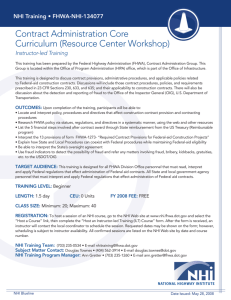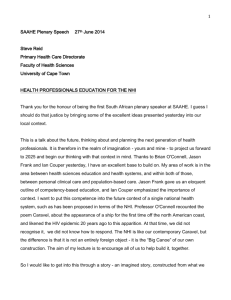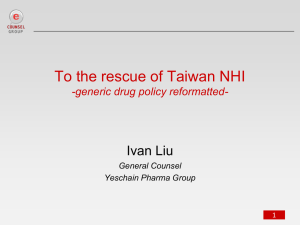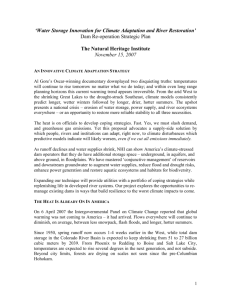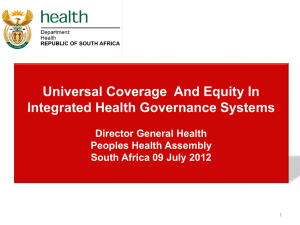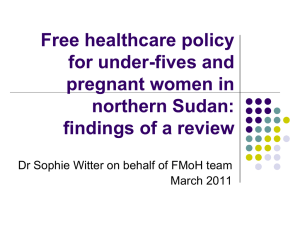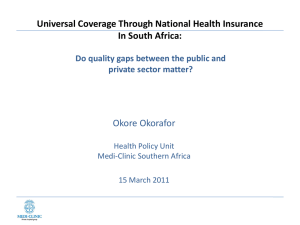Contents Where are we in IT – Taiwan's National Health
advertisement
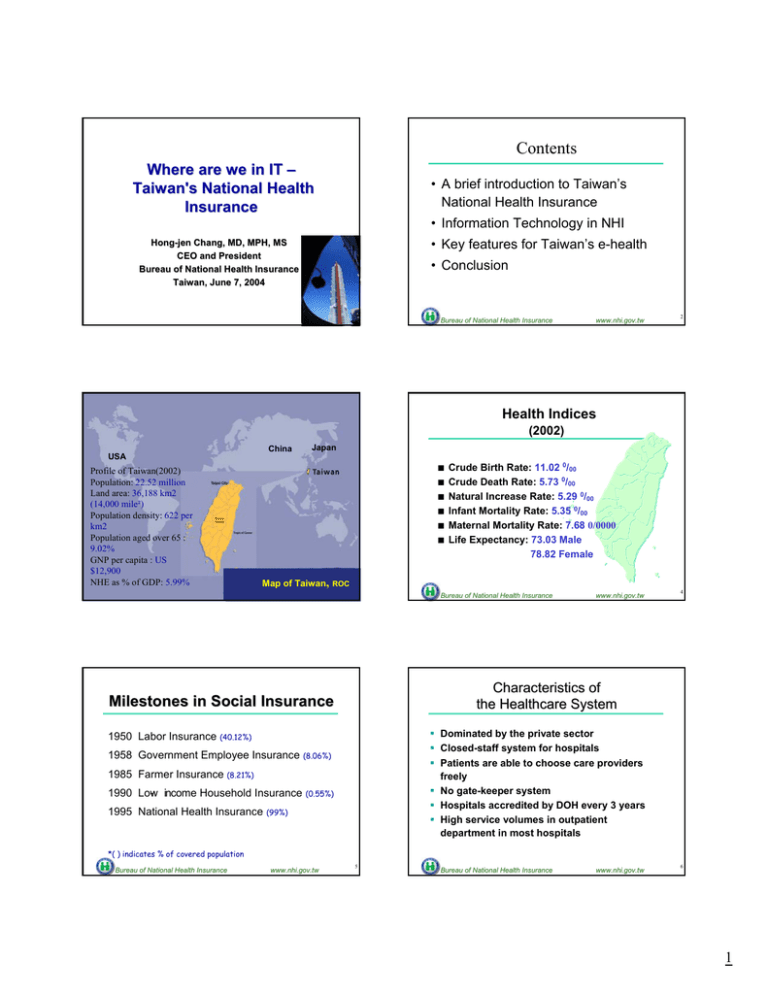
Contents Where are we in IT – Taiwan's National Health Insurance • A brief introduction to Taiwan’s National Health Insurance • Information Technology in NHI • Key features for Taiwan’s e-health HongHong-jen Chang, MD, MPH, MS CEO and President Bureau of National Health Insurance Taiwan, June 7, 2004 • Conclusion Bureau of National Health Insurance www.nhi.gov.tw 2 Health Indices (2002) China Japan USA Profile of Taiwan(2002) Population: 22.52 million Land area: 36,188 km2 (14,000 mile²) Population density: 622 per km2 Population aged over 65 : 9.02% GNP per capita : US $12,900 NHE as % of GDP: 5.99% Q Q Q Q Q Q Crude Birth Rate: 11.02 0/00 Crude Death Rate: 5.73 0/00 Natural Increase Rate: 5.29 0/00 Infant Mortality Rate: 5.35 0/00 Maternal Mortality Rate: 7.68 0/0000 Life Expectancy: 73.03 Male 78.82 Female Map of Taiwan, ROC Bureau of National Health Insurance www.nhi.gov.tw 3 (8.06%) 1985 Farmer Insurance (8.21%) 1995 National Health Insurance 4 Dominated by the private sector Closed-staff system for hospitals Patients are able to choose care providers freely No gate-keeper system Hospitals accredited by DOH every 3 years High service volumes in outpatient department in most hospitals 1950 Labor Insurance (40.12%) 1990 Low - income Household Insurance www.nhi.gov.tw Characteristics of the Healthcare System Milestones in Social Insurance 1958 Government Employee Insurance Bureau of National Health Insurance (0.55%) (99%) *( ) indicates % of covered population Bureau of National Health Insurance www.nhi.gov.tw 5 Bureau of National Health Insurance www.nhi.gov.tw 6 1 Characteristics of NHI (1) Characteristics of NHI (2) Cost sharing for ambulatory care, inpatient care, and drugs Mandatory enrollment Single - payer system Public Administration Payroll- related premium rate Comprehensive benefit package Fee-for-services under the Global budget Contribution shared by the employer, the employee and the government Bureau of National Health Insurance Health Care Expenditures per Capita, Adjusted for Cost-of-Living Differences US Dollars 5,000 7 www.nhi.gov.tw Bureau of National Health Insurance 8 www.nhi.gov.tw National Health Expenditures as % in GDP 1983 - 2002 4,631 4,500 % of GDP 6.0 4,000 3,500 NHI 5.97 5.99 5.5 5.0 4.5 4.0 1,623 3.5 1,207 893 3.70 4.00 4.10 4.00 3.90 Japan United Finland New Korea Taiwan Median [2000] Kingdom [2000] Zealand [2000] [2000] Government Sector 0.5 [2000] 0.81 1.89 1.85 1.82 1.77 1.82 1.8 1.85 0.82 0.81 0.77 0.69 0.59 0.51 0.47 0.47 0.46 0.51 0.45 9 www.nhi.gov.tw 1986 1985 1983 0.0 Information resource : 1. OECD Health Data,2000~2002 2. International Health Policy之Chart VIII-1 from Multinational Comparisons of Health System Data,2000 Bureau of National Health Insurance 1.65 1.96 2.02 1.0 1984 [2000] Health Insurance 1.5 2.00 2002 OECD [2000] 2.1 2.16 2001 Australia [2000] 2.18 1999 France [2000] 3.44 3.02 2000 Canada [2000] 3.14 1997 Germany States 2.21 2.1 Private Sector 2.0 United 3.06 2.76 2.5 0 [2000] 3.24 2.94 2.93 3.0 500 [2000] 4.93 4.77 4.81 4.20 1998 1,000 4.00 1995 1,500 4.67 3.80 1996 1,664 1993 1,763 Bureau of National Health Insurance 1994 2,012 1992 2,022 1990 2,211 2,000 1991 2,349 2,500 5.46 5.44 5.27 5.29 5.27 5.33 Total Health Expenditures 1988 2,535 1989 3,000 1987 2,748 www.nhi.gov.tw 10 Information Technology in NHI High Public Satisfaction (1995~2004) 90.0% 78.50% 80.0% 70.0% 66.5% 65.4% 60.0% 40.0% 67.2% 63.8% 63.3% 61.0% 50.0% 47.0% 76.30% 70.90% 66.40% 71.1% 68.3% 59.70% 65.6% Satisfied (DOH) Satisfied (BNHI) 50.2% Dissatisfied (DOH) Dissatisfied (BNHI) 36.5% 39.0% 27.0% 30.0% 20.0% 25.9% 23.4% 22.5% 10.0% 29.60% 24.5% 24.2% 22.0% Satisfied 20.1% 17.2% 13.60% Dissatisfied 20.60% 21.60% 15.90% 0.0% 1995/5 1995/9 1996/6 1998/1 1998/4 1998/11 1999/5 2000/3 Bureau of National Health Insurance 2000/10 2001/6 2001/12 2002/5 2002/8 2002/11 2003/7 www.nhi.gov.tw 2004/4 11 Bureau of National Health Insurance www.nhi.gov.tw 12 2 IT/Information Management for Efficiency Electronic Medical Claims The Rate of Claims through Electronic Media • Electronic claim processing system 100% – Uniform reporting procedure and format – Standardize coding system 90% 80% • Comprehensive databank • Data Warehouse for Decision support • Profile analysis system for utilization review and management • Web site provide information sharing with providers 70% 60% 50% Out-patient In-patient 40% 30% 20% 10% 0% May. Sep. Jan. May Sep. Jan. May Sep. Jan. May Sep. Jan. May Sep. Jan. May Sep. Jan. May Sep. 1995 1996 1997 1998 1999 2000 2001 Bureau of National Health Insurance www.nhi.gov.tw 13 NHI Smart Card • • • • www.nhi.gov.tw Explicit Data IC Chip Basic Data Section Healthcare Data Section Medical Data Section Health Administration Data Sec. 15 Bureau of National Health Insurance Name ID Number Birth date Photograph (Optional) www.nhi.gov.tw 16 Future Phase-In Plans • Daily monitor of utilization • Instant checkup of patient’s eligibility • Daily monitor of communicable disease Bureau of National Health Insurance 14 NHI smart card Change of Management • Monthly monitor of medical expenditure • Eligibility checkup while renew paper card • Periodically data exchange with CDC www.nhi.gov.tw Content of Smart Card A new milestone for NHI Pilot on Pescadores in May 1995. Formally implemented in January 2004 Provide timely information on “where and when” patient received healthcare services Bureau of National Health Insurance Bureau of National Health Insurance • Organ donation • Weekly monitor of hospital expenditure ÆSARS ÆInbound traveler or immigrant www.nhi.gov.tw 17 Bureau of National Health Insurance www.nhi.gov.tw 18 3 Key Features for Taiwan’s e-Health Bureau of National Health Insurance www.nhi.gov.tw 19 Taiwan’ Taiwan’s ee-Health (1) – Medical claims integrate with other data base to provide population - based information – Valuable databank for researchers, healthcare providers and policy- makers • System is designed to maximize benefit from IT – Unique identity card for every resident in Taiwan – BNHI set up various common standards for IT implementation – NHI smart card project provide network linkage environment • Privacy protection and security challenges – Patient groups – AIDS – Human right groups 21 Planning of NHII Project www.nhi.gov.tw Bureau of National Health Insurance www.nhi.gov.tw 22 Objectives of NHII Project • Establish an interoperable & integrated health information platform. • Set up an information framework to support continuous healthcare services. • Initiating national health information strategic plan to establish national health information infrastructure (NHII). • Invest from public sectors USD 670 million in the next 5 years. • Joint venture of public, private sectors, academics and industries. Bureau of National Health Insurance 20 • Integrated databank – Mobile phone subscribing rate 106.5% (ITU 2003) – Internet subscribing rate 38% – Digital Access Index No.9 in the world www.nhi.gov.tw www.nhi.gov.tw Taiwan’ Taiwan’s ee-Health (2) • People enjoy information technology Bureau of National Health Insurance Bureau of National Health Insurance – Acute care – Chronic care – Health promotion • Comprehensive national healthcare databanks to support R&D 23 Bureau of National Health Insurance www.nhi.gov.tw 24 4 Proposed Strategic Areas of NHII • Healthcare Information Technology Conclusions – NHI Smart card • Personal Health informatics – Electronic Health Record(EHR) • Public Health and Medical informatics – Clinical decision support and patient safety system – Disease Surveillance • Ethical, Legal and Social Implications Bureau of National Health Insurance www.nhi.gov.tw 25 Taiwan’s NHI system: • • • • www.nhi.gov.tw www.nhi.gov.tw 26 Possible factors contributing to the success of Taiwan’ Taiwan’s NHI • Single-payer system • Free market on delivery side Affordable Accessible to all High public satisfaction Quality of care Acceptable Bureau of National Health Insurance Bureau of National Health Insurance • IT intensive operating system • Strong generic pharmaceutical industry • Physicians willing to work very hard at relatively low physician fee • Tradition of family support • Good doctor-patient relationship 27 Bureau of National Health Insurance www.nhi.gov.tw 28 Thank you ! Bureau of National Health Insurance www.nhi.gov.tw 29 5
